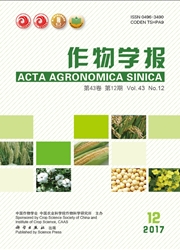

 中文摘要:
中文摘要:
为挖掘野生大豆(Glycine soja L.G07256)耐碳酸盐关键功能基因,利用前期高通量转录组测序数据,从构建的碳酸盐胁迫基因表达谱中,选取了一个碳酸盐胁迫下显著上调表达的肌醇-1-磷酸合酶类基因。采用同源克隆的方法,获得该基因的全长cDNA,命名为GsMIPS2。实时荧光定量PCR结果显示该基因受碳酸盐胁迫诱导表达,并且其表达量具有组织特异性。将GsMIPS2基因转化拟南芥,并结合拟南芥中T-DNA插入突变体atmips2来验证其耐碳酸盐功能。结果表明,碳酸盐胁迫条件下,GsMIPS2超量表达拟南芥种子萌发率显著高于野生型,而拟南芥突变体atmips2种子萌发率显著低于野生型。上述结果表明,GsMIPS2基因在植物应答碳酸盐胁迫过程中起重要作用。
 英文摘要:
英文摘要:
To identify the key functional genes in response to bicarbonate stress in Glycine soja L. G07256, we constructed a gene expression profile under bicarbonate treatment using high throughput RNA-seq data, from which we selected a myo-inositol- 1-phosphate synthase gene whose expression was significantly induced by bicarbonate stress. By homology-based cloning, we acquired its full length cDNA and termed as GsMIPS2. The results of quantitative real-time PCR demonstrated the bicarbonate stress induced expression of GsMIPS2 and its tissue expression specificity. We also verified the function of GsMIPS2 in bicarbonate responses by using the GsMIPS2 transgenic Arabidopsis combined with the T-DNA insertion line atmips2. We revealed that the germination rate of GsMIPS2 overexpression lines was significantly higher, while that of atmips2 mutant line was much lower than that of wild type under bicarbonate stress. These results indicate the positive role of GsMIPS2 in plant bicarbonate stress responses.
 同期刊论文项目
同期刊论文项目
 同项目期刊论文
同项目期刊论文
 AtPP2CG1, a protein phosphatase 2C, positively regulates salt tolerance of Arabidopsis in abscisic a
AtPP2CG1, a protein phosphatase 2C, positively regulates salt tolerance of Arabidopsis in abscisic a Alkaline-stress response in Glycine soja leaf identifies specific transcription factors and ABA-medi
Alkaline-stress response in Glycine soja leaf identifies specific transcription factors and ABA-medi Ectopic Expression of a WRKY homolog from Glycine soja alters flowering time in Arabidopsis (SCI,IF=
Ectopic Expression of a WRKY homolog from Glycine soja alters flowering time in Arabidopsis (SCI,IF= The Arabidopsis AtbZIP1 transcription factor is a positive regulator of plant tolerance to salt, osm
The Arabidopsis AtbZIP1 transcription factor is a positive regulator of plant tolerance to salt, osm GsAPK, an ABA-Activated and Calcium-Independent SnRK2-Type Kinase from G. soja, Mediates the Regulat
GsAPK, an ABA-Activated and Calcium-Independent SnRK2-Type Kinase from G. soja, Mediates the Regulat A Glycine soja ABA-responsive receptor-like cytoplasmic kinase, GsRLCK, positively controls plant to
A Glycine soja ABA-responsive receptor-like cytoplasmic kinase, GsRLCK, positively controls plant to Identification of wild soybean (Glycine soja) TIFY family genes and their expression profiling analy
Identification of wild soybean (Glycine soja) TIFY family genes and their expression profiling analy GsVAMP72, a novel Glycine soja R-SNARE protein, is involved in regulating plant salt tolerance and A
GsVAMP72, a novel Glycine soja R-SNARE protein, is involved in regulating plant salt tolerance and A A novel hybrid proline-rich type gene GsEARLI17 from Glycine soja participated in leaf cuticle synth
A novel hybrid proline-rich type gene GsEARLI17 from Glycine soja participated in leaf cuticle synth GsCML27, a Gene Encoding a Calcium-Binding EF-Hand Protein from Glycine soja, Plays Differential Rol
GsCML27, a Gene Encoding a Calcium-Binding EF-Hand Protein from Glycine soja, Plays Differential Rol Ectopic Expression of a Glycine soja myoInositol Oxygenase Gene (GsMIOX1a) in Arabidopsis Enhances T
Ectopic Expression of a Glycine soja myoInositol Oxygenase Gene (GsMIOX1a) in Arabidopsis Enhances T GsSKP21, a Glycine soja S-phase kinase-associated protein, mediates the regulation of plant alkaline
GsSKP21, a Glycine soja S-phase kinase-associated protein, mediates the regulation of plant alkaline A novel Glycine soja cysteine proteinase inhibitor GsCPI14, interacting with the calcium/calmodulin-
A novel Glycine soja cysteine proteinase inhibitor GsCPI14, interacting with the calcium/calmodulin- MicroRNA319 Positively Regulates Cold Tolerance by Targeting OsPCF6 and OsTCP21 in Rice (Oryza sativ
MicroRNA319 Positively Regulates Cold Tolerance by Targeting OsPCF6 and OsTCP21 in Rice (Oryza sativ GsGASA1 mediated root growth inhibition in response to chronic cold stress is marked by the accumula
GsGASA1 mediated root growth inhibition in response to chronic cold stress is marked by the accumula GsZFP1, a new Cys2/His2-type zinc-finger protein, is a positive regulator of plant tolerance to cold
GsZFP1, a new Cys2/His2-type zinc-finger protein, is a positive regulator of plant tolerance to cold The Positive Regulatory Roles of the TIFY10 Proteins in Plant Responses to Alkaline Stress (SCI,IF=3
The Positive Regulatory Roles of the TIFY10 Proteins in Plant Responses to Alkaline Stress (SCI,IF=3 A Glycine Soja 14-3-3 Protein GsGF14o Participates in Stomatal and Root Hair Development and Drought
A Glycine Soja 14-3-3 Protein GsGF14o Participates in Stomatal and Root Hair Development and Drought GsTIFY10, a novel positive regulator of plant tolerance to bicarbonate stress and a repressor of jas
GsTIFY10, a novel positive regulator of plant tolerance to bicarbonate stress and a repressor of jas 期刊信息
期刊信息
